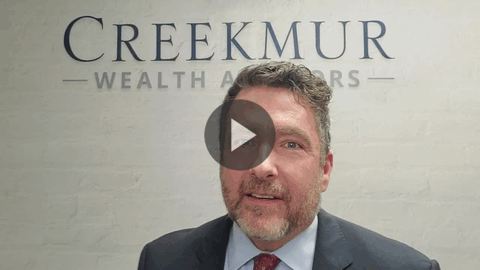Each year as we look ahead at all we want to accomplish - and look back at all we wished we had done last year it's easy to feel some regret. If you're like me you might find yourself thinking "I wish I woulda. . ." or "I shoulda. . ." or "If only I coulda. . .". But experience tells me that shoulda, coulda, woulda doesn't help us move forward.
Topics: Build Wealth, Build True Wealth, financial legacy, From John's Desk

Things you can do for your future as the year unfolds.
What financial, business, or life priorities do you need to address for the coming year? Now is a good time to think about the investing, saving, or budgeting methods you could employ toward specific objectives, from building your retirement fund to managing your taxes. You have plenty of choices. Here are a few ideas to consider:
Topics: Budgeting, Build True Wealth, Financial Planning, Goals, Investing, Investments, long term objectives, Planning, RMD, RMDs, saving and investing, Stay focused on objectives
What People Overlook When Shopping for Life Insurance
A few realities that must be acknowledged.
Shopping for life insurance means paying attention to detail. In scrutinizing these details, however, some fundamental, big-picture truths may be ignored.
If you want to renew or upgrade coverage later in life, the terms could be less than ideal. You may be healthier than most of your peers, you may have the constitution of someone half your age, but insurers base policy premiums and terms of coverage on actuarial norms, not exceptions. Purchase a term life policy at age 50, and your premiums may be considerably more expensive than if you had bought the same coverage at age 30. This is the way of the insurance business.1
Have you had a serious illness? Have you been diagnosed with a medical condition, such as diabetes, sleep apnea, or high blood pressure? You are looking at higher life insurance premiums, and insurers may limit the amount of life insurance coverage you can buy.2
A guaranteed acceptance life insurance policy may be the answer, but even with one of these policies, you may have to live a certain number of years after buying the coverage for your heirs to receive a death benefit. Many times, if the insured dies within 2-3 years of the policy purchase, the named beneficiaries only receive an amount equivalent to the premiums that have been paid, plus interest.2
Your beneficiaries need to know that you own life insurance. Roughly $1 billion in life insurance payouts sit unclaimed in America. Why? The beneficiaries are unaware of them. Also, sometimes beneficiary designations are hazy; a “husband” is named as a primary beneficiary on a policy, but the insured has married more than once, so an ex-spouse contests the beneficiary form. Such legal challenges may generate court costs offsetting the financial value of the death benefit.3
While it seems obvious to inform heirs about a life insurance policy, some people never do – and this simple oversight continues to obstruct life insurance payouts.
You need to name a beneficiary in the first place. Some consumers fail to, however, and that can create problems. If you do not designate a beneficiary for your life insurance policy, its death benefit could be included in your estate, exposed to probate and creditors.4
You must also recognize that you could live much longer than you expect. Years ago, most life insurance policies were sold with the assumption that the insured party would die by age 100. If the policyholder lived beyond that maturity date, the insurer would simply pay out the cash value of the policy (or something similar) to the insured person at that time.5
Topics: Uncategorized, Build True Wealth, Financial Planning, Insurance policies, Life Insurance
Why Do People Put Off Saving For Retirement?
A lack of money is but one answer.
Common wisdom says that you should start saving for retirement as soon as you can. Why do some people wait decades to begin?
Nearly everyone can save something. Even small cash savings may be the start of something big if they are invested wisely.
Sometimes, the immediate wins out over the distant. To young adults, retirement can seem so far away. Instead of directing X dollars a month toward some far-off financial objective, why not use it for something here and now, like a payment on a student loan or a car? This is indeed practical, and it may be necessary. Even so, paying yourself first should be as much of a priority as paying today’s bills or paying your creditors.
Some workers fail to enroll in retirement plans because they anticipate leaving. They start a job with an assumption that it may only be short term, so they avoid signing up, even though human resources encourages them. Time passes. Six months turn into six years. Still, they are unenrolled. (Speaking of short-term or transitory work, many people in the gig economy never get such encouragement; they have no access to a workplace retirement plan at all.)
Other young adults feel they have too little to start saving or investing. Maybe when they are further along in their careers, the time will be right – but not now. Currently, they cannot contribute big monthly or quarterly amounts to retirement accounts, so what is the point of starting today?
The point can be expressed in two words: compound interest. Even small retirement account contributions have potential to snowball into much larger sums with time. Suppose a 25-year-old puts just $100 in a retirement plan earning 8% a year. Suppose they keep doing that every month for 35 years. How much money is in the account at age 60? $100 x 12 x 35, or $42,000? No, $217,114, thanks to annual compounded growth. As their salary grows, the monthly contributions can increase, thereby positioning the account to grow even larger. Another important thing to remember is that the longer a sum has been left to compound, the greater the annual compounding becomes. The takeaway here: get an early start.1
Any retirement saver should strive to get an employer match. Some companies will match a percentage of a worker’s retirement plan contribution once it exceeds a certain level. This is literally free money. Who would turn down free money?
Just how many Americans are not yet saving for retirement? Earlier this year, an Edward Jones survey put the figure at 51%. If you are reading this, you are likely in the other 49% and have been for some time. Keep up the good work.2
Topics: Uncategorized, Wealth Management, Build True Wealth, Financial Freedom, Financial Planning, Investing, Investments, Money, Retirement, Saving
Sometimes more money can mean more problems.
“Lifestyle creep” is an unusual phrase describing an all-too-common problem: the more money people earn, the more money they tend to spend.
Frequently, the newly affluent are the most susceptible. As people establish themselves as doctors and lawyers, executives, and successful entrepreneurs, they see living well as a reward. Outstanding education, home, and business loans may not alter this viewpoint. Lifestyle creep can happen to successful individuals of any age. How do you guard against it?
Keep one financial principle in mind: spend less than you make. If you get a promotion, if your business takes off, if you make partner, the additional income you receive can go toward your retirement savings, your investment accounts, or your debts.
See a promotion, a bonus, or a raise as an opportunity to save more. Do you have a household budget? Then the amount of saving that the extra income comfortably permits will be clear. Even if you do not closely track your expenses, you can probably still save (and invest) to a greater degree without imperiling your current lifestyle.
Avoid taking on new fixed expenses that may not lead to positive outcomes. Shouldering a fixed mortgage payment as a condition of home ownership? Good potential outcome. Assuming an auto loan so you can drive a luxury SUV? Maybe not such a good idea. While the home may appreciate, the SUV will almost certainly not.
Resist the temptation to rent a fancier apartment or home. Few things scream “lifestyle creep” like higher rent does. A pricier apartment may convey an impressive image to your friends and associates, but it will not make you wealthier.
Keep the big goals in mind and fight off distractions. When you earn more, it is easy to act on your wants and buy things impulsively. Your typical day starts costing you more money.
To prevent this subtle, daily lifestyle creep, live your days the same way you always have – with the same kind of financial mindfulness. Watch out for new daily costs inspired by wants rather than needs.
Live well, but not extravagantly. After years of law school or time toiling at start-ups, getting hired by the right firm and making that career leap can be exhilarating – but it should not be a gateway to runaway debt. According to the Federal Reserve’s latest Survey of Consumer Finances, the average American head of household aged 35-44 carries slightly more than $100,000 of non-housing debt. This is one area of life where you want to be below average.1
Topics: Uncategorized, Build True Wealth, Financial Planning, Goals, Money


